#957 Transmission of the Queer
The Walking Boy
by Lydia Kwa
Vancouver: Arsenal Pulp Press, 2019 (first published by Key Porter Books, 2005)
$19.95 / 9781551527635
Reviewed by Paul Falardeau
*
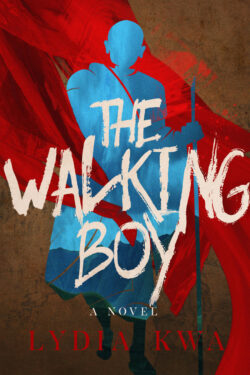 “To transmit the strange” is a fine goal to be set before a writer. One with the talents of Lydia Kwa might find in it the chance to do something great and subversive. In The Walking Boy, she combines historical fiction with magical realism in a way that simultaneously ensnares her reader and asks them to reconsider what they know — or believe they know.
“To transmit the strange” is a fine goal to be set before a writer. One with the talents of Lydia Kwa might find in it the chance to do something great and subversive. In The Walking Boy, she combines historical fiction with magical realism in a way that simultaneously ensnares her reader and asks them to reconsider what they know — or believe they know.
The Walking Boy has an interesting history. First published in 2005, it received a nomination for the Ethel Wilson Fiction Prize. Over a decade later, Kwa released The Oracle Bone, a prequel to The Walking Boy set some forty years before it. In 2019, Arsenal Pulp Press has rereleased Walking Boy, which is the edition this review focuses on. Now the second book in a proposed trilogy, the revised Walking Boy reflects some of the events and characters that were introduced in Oracle Bone and intertwines itself with that story. That said, both Oracle Bone and The Walking Boy work as stand-alone novels and one might start by reading either.
In the preface, Lydia Kwa explains that this novel is Chuanqi, 傳奇, a Chinese narrative tradition, popular during Tang dynasty (when this novel is set). The literal meaning of this is, “to transmit the strange,” and Walking Boy holds up as its own strange transmission. One can immediately see the appeal; most of us turn to literature for tales of the odd and the extraordinary. Kwa sets out to do this, but she also adds that this occurs while she conducts “experiments in literary subversion.”
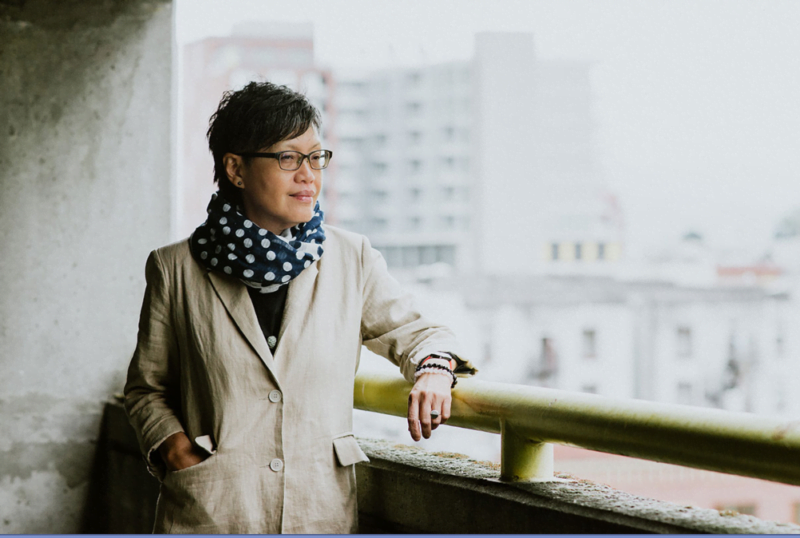
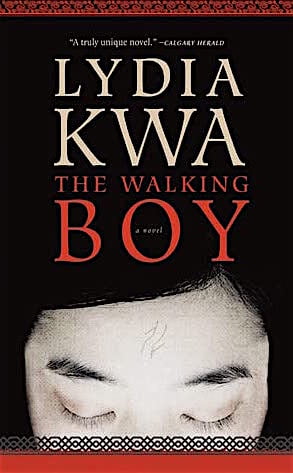
Set in China, during the early 8th century CE, The Walking Boy is an historical fiction set as China’s only female emperor, Wu Zhao — known as Nü Huang while in power — is sitting in the last years of her reign. Tang China is alive and bustling, from the mountains and countryside to the energetic streets of Chang’an, the empire’s eastern capital. At the time, Chang’an was the largest city in the world and the metropolis is home to a bustling, diverse menagerie. Here we find Buddhists and Taoists intermingling and competing for influence, but also a city that is home to Hindus, Muslims, and even the occasional Christian cult. The beliefs of these various people spill out into the landscape of the book, and the various corners of its narrative are filled with alchemy and demons, mixed with religious teachings and political machinations. The lives of the book’s characters bleed into its setting. The smells, sounds, and tastes waft from the page and intermingle in a dizzying cacophony. Meanwhile, preachers preach, dancers dance, lovers love.
To paint this picture in a way that does justice to this important historical nexus, Kwa takes up multiple narrators and settings throughout the empire. Shangguan Wan’er is an imperial secretary to the Emperor, contending with her own mixed feelings towards her regent as she sifts through schemes and plots of the court; Ardhanari is a sculptor from Khotan that is called away suddenly to a great undertaking at the Mogao caves and the Emperor; Nü Huang is a paranoid ruler who cannot forget the past as she strives to become immortal. These characters come and go from each other’s stories. Some never meet. However, it is the story of Baoshi, the titular walking boy who surreptitiously connects them as he tries to fulfill the quest set before him by his ailing master, known only as “Harelip.” Many of the characters in Walking Boy are grappling with the consequences of the events of Oracle Bone, yet the draw of Walking Boy is how they grapple with themselves and their own perceived identities and destinies.
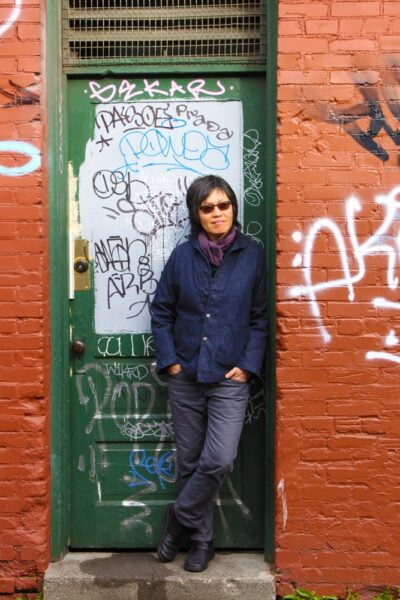
The Walking Boy is a reference to Baoshi’s quest to find his master’s former lover, the sculptor, Ardhanari. It’s one of the many relationships that are portrayed in the book that don’t conform to traditional ideas about gender, sexuality, and bodies. Yet, perhaps this is the subversion that Kwa speaks of, because our narrators don’t consider themselves queer, or think of themselves as wrong. They simply find themselves mired in love or lust or loss. That the story is set more than 1300 years in the past begs the question of whether we can really claim queerness is not traditional, or at least as traditional as anything else. This, of course, may be where Kwa is adding the fiction into the “historical fiction.” That the story also happens to take place away from Christian values that are often oppressive in their treatment of queer folxs seems to add even more wiggle room.
There is, though, a historical basis for many of these elements. For instance, the characters of the Jogappas who take Baoshi in are a historical community of vibrant, devoted transgender worshippers of the god Yellamma. In a 2018 article in the prominent Buddhism magazine, Tricycle, Dr. Jay Michaelson reminds his readers that Buddhism has often been a refuge for people who identify as LGBTQ2S+ and that, in the past, Buddhism has shown more flexibility around queerness than other religions. Even if it doesn’t have a completely clear conscience, there are plenty of instances of same sex relationships between monks, gender-fluid gods and ancestors, homoerotic samurai (Edo Japan was a haven for male-male relationships at least), and His Holiness, the 14th Dalai Lama, after waffling a bit, admitted that rules forbidding homosexuality are not part of the direct teachings of the Buddha and thus might evolve over time.
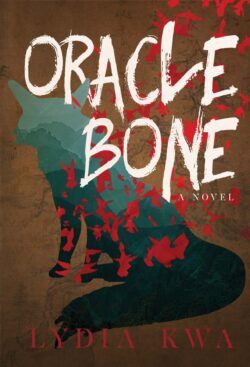
Whether Tang China truly was as liberal a place as Kwa depicts is ultimately irrelevant, because her story allows the reader to explore a reality where it is, and is reminded of the good things that happen when people follow their love for one another. Each character has a story arc that ultimately finds them questioning who they are and what they want versus what destiny has laid before them. At the centre of this is Baoshi, who feels that he must keep a secret about himself while journeying through the world outside the hermitage where he and Harelip live. As Kwa overlays the footsteps of his journey with those of the others in his world, he begins to come to terms with the shame that has been put on him; he also is able to start taking control of his identity. “Words,” Harelip reminds him on his journey’s outset, “are merely sounds. They’re nothing until one imparts meanings to them.” After all, though “strange” and “queer” are synonyms, and may once have been equally offensive ways to describe another person, one has now become a term of pride and describes an ever-growing section of humanity that rejects the falsely narrow views of human potential and expression.
Kwa’s work is powerful because she has transmitted the strange on many levels. Yes, this is a story about demons and spirits; the folklore of Tang China come to life, but It is also a transmission of the Queer, a representation and amplification of identities that have historically been buried in dusty pages of old books, or left out completely. Like words, practices and meanings shift over time. History is not as set in stone as we think. Ultimately Kwa is wonderfully successful in her transmission of the strange. She delivers an exciting story, full of unique characters who challenge our common beliefs about the past, present, and future. The more we transmit between time and place, the more strange and beautiful it all becomes.
*
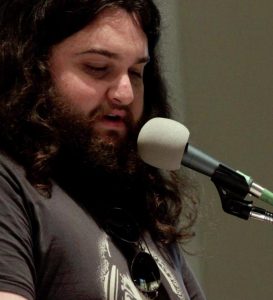
Paul Falardeau is a poet, essayist, brewer and most recently, an English teacher, living in Vancouver, a city on the unceded lands of the Musqueam, Squamish and Tsleil-Waututh First Nations, whom he offers respect and gratitude. He is a graduate of University of the Fraser Valley and Simon Fraser University. He has published in Pacific Rim Review of Books, subTerrain, and Cascadia Review, and he contributed an essay to Making Waves: Reading B.C. and Pacific Northwest Literature (Anvil Press, 2010). Editor’s note: Paul Falardeau has reviewed fiction by Sam Weibe, Yasuko Thanh, and Richard Van Camp for The Ormsby Review, as well as many books of poetry.
*
The Ormsby Review. More Books. More Reviews. More Often.
Publisher and Editor: Richard Mackie
The Ormsby Review is a journal service for in-depth coverage of B.C. books and authors. The Advisory Board consists of Jean Barman, Robin Fisher, Cole Harris, Wade Davis, Hugh Johnston, Patricia Roy, David Stouck, and Graeme Wynn. Scholarly Patron: SFU Graduate Liberal Studies. Honorary Patron: Yosef Wosk. Provincial Government Patron since September 2018: Creative BC
“Only connect.” – E.M. Forster
2 comments on “#957 Transmission of the Queer”